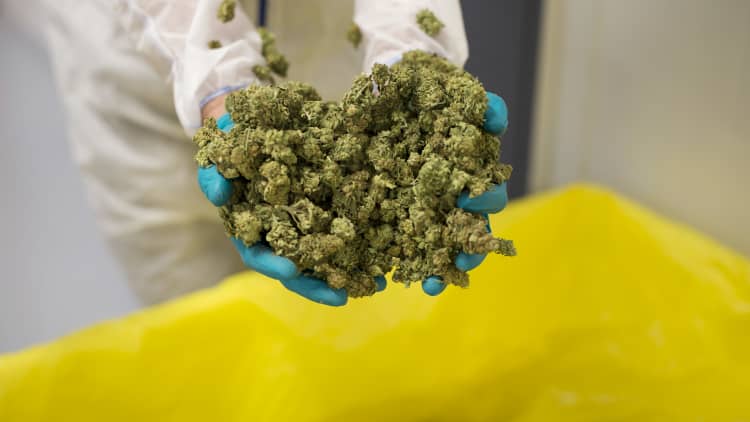The passage of the 2018 Farm Bill by Congress moves Canadian pot producer Canopy Growth one step closer to activity in the United States, the company's chief executive told CNBC on Wednesday.
The "Farm Bill is the first step to active" involvement in the U.S. by Canopy Growth, CEO Bruce Linton told CNBC Wednesday. " The world's changing: This is the first step in the U.S. to manage cannabinoids."
The $867 billion bill includes a provision for industrial hemp legalization that Senate Majority Leader Mitch McConnell, R-Ky., had introduced. The bill was passed by the U.S. Senate on Tuesday and the House of Representatives on Wednesday, sending it to President Donald Trump's desk for signature.
McConnell's provision removes industrial hemp from the federal government's list of controlled substances, making it a lawful agricultural commodity.
But of interest to public cannabis companies is the bill's implications for the U.S. market for cannabidiol, a "non-psychoactive" chemical found in hemp and marijuana. The legislation has been cited by numerous public cannabis companies as the catalyst to formally enter the American CBD market, according to Cowen analyst Vivien Azer.
"This new [bill] version creates far more certainty around the legality of the commercial sale of hemp-derived products (with less than 0.3 percent THC, namely CBD), and codifies the legality of interstate commerce," Azer wrote Tuesday.
Industry publication Hemp Business Journal estimates the total retail value of hemp products sold in the U.S. in 2017 to be at least $820 million, with help derived CBD products constituting 23 percent of sales. Laws involving CBD products vary from state to state.
CBD proponents claim the compound doesn't produce a high like marijuana, but produce benefits such as anxiety relief and inflammation reduction. Shares of Canopy Growth were down 2.8 percent Wednesday afternoon, though are up 36 percent year to date.
To be sure, Linton said, the passage of the bill is a "big deal, but it's not a finish line." The CEO said that approval of the Farm Bill would pose "a lot of 'what's-next?'" questions, including how much CBD could be added to food or beverages.
Canopy recently bought Colorado-based hemp researcher, Ebbu, which specializes in the purification and study of cannabinoids for product development. It also uses patented plant genetics to maximize cannabinoid output by "boosting in-plant cannabinoid production and creating rare-cannabinoid-specific plants."
The Farm Bill also includes a provision that preserves the Food and Drug Administration's regulatory authority, meaning it's still illegal to add THC and CBD to food products. Currently, food products aren't allowed to include active ingredients that have been approved as drug products or are involved in clinical research. However, this regulation applies only to products that are introduced in interstate commerce.




